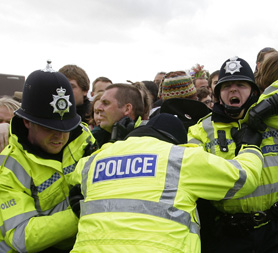Judges should ‘sign off covert policing’
All undercover police operations should be approved by a judge before they begin, the head of the Association of Chief Police Officers, Sir Hugh Orde, tells a meeting of human rights activists.

The meeting, organised by civil liberties group Liberty, was a chance for Sir Hugh to respond to criticism of undercover policing operations, following the revelations that a Metropolitan Police constable, Mark Kennedy, spent several years posing as an environmental activist.
At present all responsibility for undercover operations lies with senior police officers, a system that Sir Hugh said was no longer sufficient to secure public confidence.
He told Channel 4 News: “Covert policing can be signed off by a police superintendant with no independent oversight at all. The idea of a judge doing it in the future goes some way to restoring public confidence that has been damaged by recent revelations.”
Liberty director Shami Chakrabarti said it was a move in the right direction, telling Channel 4 News: “It’s odd isn’t it that the police have to go to a magistrate before they search your house and they have to go to a politician before they intercept your phone calls, but a policeman can build a long term intimate relationship with you as an imposter with no external independent oversight whatsoever.
“The police shouldn’t be able to authorise themselves to infiltrate protest movements for years on end without any kind of external accountability.” Liberty’s Shami Chakrabarti
She added: “The police shouldn’t be able to authorise themselves to infiltrate protest movements for years on end without any kind of external accountability. The public will feel more confident if they know that an independent judge has decided whether the use of such an intrusive technique is proportionate or not.
She said Sir Hugh’s comments were an unusual step for a senior police officer: “I have never in my career heard a senior police officer call for less rather than more power so I am really heartened by Hugh’s speech.”
Mark Kennedy investigations
At the heart of the controversy over undercover policing is Mark Kennedy, a former Metropolitan Police officer who became a well-known figure within the activist movement. One of the most high-profile actions that he was involved with was an attempt by climate change activists to shut down the Ratcliffe-on-Soar power station in Nottinghamshire.
The trial of six of the activists accused of being involved in the plan collapsed in January, when the Crown Prosecution Service dropped all charges against them. The CPS said new information had come to light that undermined the prosecution case.
Sir Hugh Orde confirmed that the Independent Police Complaints Commission is investigating the alleged failure of Nottinghamshire Police to disclose relevant material to the CPS in the case. The Crown Prosecution Service has already said it will be reviewing the convictions of a linked trial that saw 20 protestors found guilty of conspiracy to commit aggravated trespass at the Ratcliffe-on-Soar site.
Sir Hugh referred to the inquires in his speech, saying:”This is one way we are accountable to the law and to the public.” But Oliver Knowles, one of the six environmental activists acquitted at Nottingham Crown Court, said any inquiry into the Mark Kennedy case should be carried out by an independent body.
“Something has gone very wrong with undercover policing in the UK over the last few years and there are many issues unresolved,” he said. “Police-led investigations are inadequate because they are not transparent. Any inquiry should be open, transparent and judge-led so that the public can have faith in it.”
The Serious and Organised Crime Agency is also independently reviewing the actions of PC Kennedy to identify whether they were consistent with those authorised for his deployment.
‘A legitimate tactic’
Sir Hugh Orde stressed, however, that undercover operations would remain a tool for the police to use where needed, saying: “This is one way of reassuring the public that it is a legitimate tactic that is subject to robust challenge before it is used.”